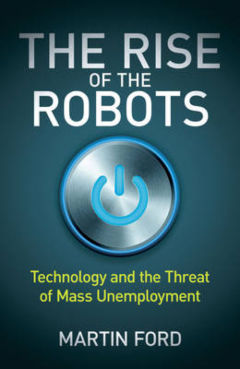Robin Jackson urges everyone with an interest in achieving welfare reform to read Martin Ford's book and consider the important issues it raises.
Author: Martin Ford
Reviewed by: Robin Jackson
The title of this book might encourage one to believe that we are being invited to enter a frightening science-fictional world. But the world which the author describes is one with which he is thoroughly familiar having worked in software development for more than 25 years.
Ford has observed at firsthand the extraordinary acceleration in computing power. One widely held belief he challenges is the assumption that automation is primarily a threat to workers who have little education and lower-level skills. However, he points out a great many university-educated, white collar workers are going to discover that their jobs, too, are in the sights as software automation and predictive algorithms advance rapidly in capability. A consequence of all of this is that acquiring more education and skills will not necessarily offer effective protection again job automation in the future.

Ford takes, as one example, radiologists, medical doctors who specialize in the interpretation of medical images. Radiologists require a lengthy training. Yet, computers are rapidly getting better at analyzing images. It’s not difficult to imagine that someday, in the not too distant future, radiology will be a job performed almost exclusively by machines. Ford notes that wages for new university graduates have been declining over the past decade, while up to 50% of new graduates are forced to take jobs that do not require a degree. Employment for many skilled professionals – including lawyers, journalists and scientists – is already being significantly eroded by advancing information technology.
The author observes that information technology is a general-purpose technology and its impact will occur across the board. Virtually every industry in existence is likely to become less labour-intensive as new technology is assimilated into business models – and that transition could happen quite rapidly. All of this suggests to Ford that we are headed toward a transition that will put enormous stress on both economies and societies throughout the world. Beyond the potentially devastating impact of long-term unemployment and underemployment on individual lives and on the fabric of society, there will be a significant economic price. He predicts that the virtuous feedback loop between productivity, rising wages and increasing consumer spending will collapse. Indeed, that positive feedback effect is already seriously diminished: we now face soaring inequality not just in income but also in consumption.
But it is not just technology that will shape our future, rather it will intertwine with other major societal and environmental challenges such as an aging population, climate change and resource depletion. Ford concludes that if we don’t recognize and adapt to the implications of advancing technology, we may face the prospect of a ‘perfect storm’ where the impacts from soaring inequality, technological unemployment and climate change unfold roughly in parallel, and in the process amplify and reinforce one another. The most frightening disclosure by Ford is the inevitability that machines will eventually be invented that are capable not only of thinking but of out-thinking humans. A point will then be reached when it is perfectly possible that governments may be created and run by robots with no human involvement.
Any discussion about creating a fairer society in which the needs of the disadvantaged are met has to be set against the impact of the kind of technological developments described by Ford. It is important to re-emphasise here that Ford is not just describing what may happen in a distant future but what is happening now. As we move into these uncharted waters, we have to face the fact that we don’t possess the maps to help us navigate a safe course.
Pleading for greater investment by the government in health, social and education services at this time is not the answer. We will need to think far more radically. In the reviewer’s opinion, this could involve a lesser role for the state in the provision of services through the processes of decentralisation, debureaucratisation and deprofessionalisation. For example, a case could be made for shortening the length of medical and nurse training in the light of current and future technological advances. By significantly shortening the length of training for doctors and cutting their currently excessively high salaries, considerable savings could be achieved. In local surgeries most GPs could be replaced with nurse practitioners and paramedical staff responsible for operating diagnostic equipment. Some of the significant savings achieved could be directed to improving front-line day and residential services for people with disabilities and the elderly which are seriously underfunded. Social justice demands that a rebalancing of resources should be undertaken.
What this reviewer is seeking to argue is that because the political and social landscape is and will continue to undergo accelerating change, we need to come up with radical ideas for the creation of new structures and ways to redistribute scarce resources. If we wait - events will overtake us and we will end up with the mass unemployment to which Ford makes reference. Given the speed of technological advances that time may not be so far away. We need to act now. No-one with an interest in achieving welfare reform can afford to ignore this book and the important issues it raises. To the author’s great credit we are presented with a book written with commendable clarity, deep insight and refreshingly free of unintelligible techno-speak so beloved of computer geeks.
The publisher is Oneworld Publications.
The Rise of the Robots © Martin Ford 2015.
Review: The Rise of the Robots © Robin Jackson 2016.
All Rights Reserved. No part of this paper may be reproduced in any form without permission from the publisher except for the quotation of brief passages in reviews.
community, nature & economics, England, Reviews